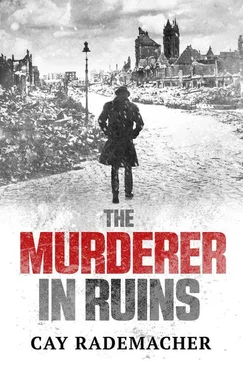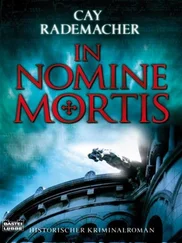Cay Rademacher - The Murderer in Ruins
Здесь есть возможность читать онлайн «Cay Rademacher - The Murderer in Ruins» весь текст электронной книги совершенно бесплатно (целиком полную версию без сокращений). В некоторых случаях можно слушать аудио, скачать через торрент в формате fb2 и присутствует краткое содержание. Год выпуска: 2015, ISBN: 2015, Издательство: Arcadia Books Limited, Жанр: Триллер, на английском языке. Описание произведения, (предисловие) а так же отзывы посетителей доступны на портале библиотеки ЛибКат.
- Название:The Murderer in Ruins
- Автор:
- Издательство:Arcadia Books Limited
- Жанр:
- Год:2015
- ISBN:9781910050750
- Рейтинг книги:5 / 5. Голосов: 1
-
Избранное:Добавить в избранное
- Отзывы:
-
Ваша оценка:
- 100
- 1
- 2
- 3
- 4
- 5
The Murderer in Ruins: краткое содержание, описание и аннотация
Предлагаем к чтению аннотацию, описание, краткое содержание или предисловие (зависит от того, что написал сам автор книги «The Murderer in Ruins»). Если вы не нашли необходимую информацию о книге — напишите в комментариях, мы постараемся отыскать её.
The Murderer in Ruins — читать онлайн бесплатно полную книгу (весь текст) целиком
Ниже представлен текст книги, разбитый по страницам. Система сохранения места последней прочитанной страницы, позволяет с удобством читать онлайн бесплатно книгу «The Murderer in Ruins», без необходимости каждый раз заново искать на чём Вы остановились. Поставьте закладку, и сможете в любой момент перейти на страницу, на которой закончили чтение.
Интервал:
Закладка:
‘Glad to hear it. I thought you might be waiting for the next murder to see if anything might turn up.’
‘We don’t even know for sure if both murders were committed by the same killer.’
‘But you’re working on that assumption?’
Stave said nothing.
Ehrlich waved a hand wearily towards the window. He had long-fingered hands, Stave noticed, pianists’ hands.
‘I suspect that the perpetrator you are looking for is 30 or younger,’ the prosecutor said.
‘In that case you know more than I do.’
Ehrlich took his horn-rimmed glasses off, and began cleaning them. He probably can’t recognise me without them, Stave thought.
‘A 30-year-old,’ the prosecutor began, ‘would have been born in the turnip winter of 1916/17, the year of serious famine in the last war. That was followed by revolution and then counter-revolution. The failed right-wing putsch in Berlin; hyperinflation with your thousand Reichsmark notes being carried around in laundry baskets; the unemployment of the 1929 Depression; the street fighting between the Storm Troops and the Red Front from 1930 onwards; the Nazi terror; the war; bomber raids; concentration camps; occupation, and now this winter. What you and I still think of as normality hasn’t existed for the last 30 years. Normality has become violence, suffering, death. That is why I think someone who can strangle a young woman and an old man with apparently methodical indifference has to be someone who has never known anything but violence in his life. That makes him 30 years old, or younger.’
‘I can’t exactly subpoena every young person in Hamburg,’ Stave mumbled. ‘And not every 30-year-old is a killer.’
‘If you include soldiers, Gestapo men, party functionaries, concentration camp guards and senior officials in the old regime in that group, then I’m afraid I must contradict you. Seen like that most young people are guilty.’
‘And a lot of older people too. That is hardly a help.’
‘Are you aware of my oath of office?’ Ehrlich asked him.
Stave shook his head, confused.
‘I swear, by God the Almighty, to apply and carry out the law of Germany with justice and mercy towards everyone irrespective of religion, race, urging or political conviction, to the advantage of none and disadvantage of none; that I shall follow the laws of Germany and the legislation of the military government according to the word and intent, and that I shall at all times do my best to respect the equality of all before the law. So help me, God.
‘The equality of all before the law, Stave. Have you any idea how many officials the British-controlled Committee for Denazification scrutinised in Hamburg alone? More than 66,000. And how many were dismissed because of their Nazi past? 8,800. Do you know where Jews who survived the concentration camps have to sign up when, in their weakened state, they are entitled to apply for larger rations?’
‘At the police station.’
‘Exactly. At the police station, sometimes in the same building, even in the exact same offices where the Gestapo used to sit. And who do you think is sometimes still sitting in those offices?’
The prosecutor paused for a moment, then said: ‘The police separates concentration camp survivors into three groups. Group 1A: party political offenders. In other words, Social Democrats and Communists. Interesting, isn’t it, that the police still use the term “offenders”? Then there is Group 1B: other political offenders. And finally 1C: criminals and anti-social elements. Which group, would you suggest, do the Jews come under?
‘Anyone who can survive all this humiliation gets a special ration from the Red Cross: a loaf of bread, a tin of meat, five Reichsmarks for a meal in a public canteen, and eight weeks of extra coupons on their ration cards. That’s it. Because the doctors of Hamburg’s Medical Council have decreed, and I quote, that “the general state of health and nourishment of a concentration camp inmate is satisfactory”.’
Ehrlich’s face had gone red, his hand was no longer waving out the window but clasped around his teacup, his knuckles so white that Stave was afraid the porcelain might shatter at any moment.
‘Even so,’ the prosecutor continued, ‘I shall do everything to ensure the “equality of all before the law”. And do you know why? Because I do not want revenge, I want justice. Because only justice will let us build a better state. Because only justice will banish fear. Because only justice will allow us to raise a generation for whom “normality” will actually be normal again.’
‘Two strangled bodies isn’t exactly normal,’ Stave muttered.
‘Two strangled bodies is not normal; it is tragic, but it is hardly threatening. However, what if two becomes three? Or four? People will start to become afraid. And frightened people look towards a strong man, someone who will clean things up without worrying about collateral damage. And that, Stave, is absolutely the last thing we need. That would sabotage everything I work for here on a daily basis.’
‘It’s what I work for too,’ Stave said wearily.
Ehrlich smiled for the first time. ‘I know that. That’s why I’m speaking openly with you. I don’t want to put pressure on you.’
‘But that’s what you’re doing.’
‘That’s what I’m doing. The circumstances are doing it. We absolutely have to stop these killings. If only it were summer, if the homeless were just starving but not freezing and squatting out there in the darkness at the same time, then murders like this would horrify us but that might be all. But right now, in this miserable, long, destructive winter, the city is on the brink of total collapse. Nothing works properly any more, absolutely nothing. You experience it every day. The camel’s back is already overloaded, if I can put it that way.’
‘And these murders might be the last straw.’
‘That’s what I mean. So as far as I am concerned you have permission to interrogate every single citizen of Hamburg, up to and including the mayor if you have to! Turn over every single stone in the mountains of rubble until you find a lead. Tell me your most absurd suspicions, the most implausible ideas. I have your back, inspector. But find me the killer!’
Stave thought over what the prosecutor had said on his short walk back to HQ. He had the backing of Ehrlich, a public prosecutor with the best of contacts amongst the British. A public prosecutor set on hunting down former secret concentration camp guards and who in most cases demanded the death penalty, which the judges usually passed. You could have worse allies, he thought.
So anxious was he to get back to work that the chief inspector ran down the hallway, barely noticing his limp. He threw open the door to the anteroom without knocking.
‘Frau Berg, please call Inspector Maschke and Lieutenant MacDonald and tell them to come to my office,’ he said, hoping his voice sounded normal.
A few minutes later the two were in his room. Stave gave them a rough summary of his meeting with Dr Ehrlich. ‘We can do whatever we want and we have his full support,’ he said in conclusion.
‘Full support for what precisely?’ Maschke asked.
Stave had been thinking about that for the past two days, ever since the raid on the Hansaplatz. Both the lines of enquiry he now wanted to follow were frankly a pain. One of them was politically delicate to say the least. The second would involve them treading on toes, toes that belonged to important people whose private lives they would need to look into.
‘We’re going to take on the Displaced Persons files, every single one of them.’ He turned to MacDonald and added, ‘Obviously that means we are going to need the agreement of the British authorities.’ That was the politically delicate part. ‘And we are going to investigate every single missing person in Hamburg,’ this to Maschke. ‘That means not just going through the lists of names and ages. We are going to burrow around in each and every case.’ That would mean digging into private lives. Either our two victims are DPs, in which case we will find a link to them in the camps. Or they are natives of Hamburg, in which case somebody somewhere must have realised they’re missing – maybe just one person, and maybe that person has a reason for not coming forward. One way or another we are going to find out who they are.’
Читать дальшеИнтервал:
Закладка:
Похожие книги на «The Murderer in Ruins»
Представляем Вашему вниманию похожие книги на «The Murderer in Ruins» списком для выбора. Мы отобрали схожую по названию и смыслу литературу в надежде предоставить читателям больше вариантов отыскать новые, интересные, ещё непрочитанные произведения.
Обсуждение, отзывы о книге «The Murderer in Ruins» и просто собственные мнения читателей. Оставьте ваши комментарии, напишите, что Вы думаете о произведении, его смысле или главных героях. Укажите что конкретно понравилось, а что нет, и почему Вы так считаете.











